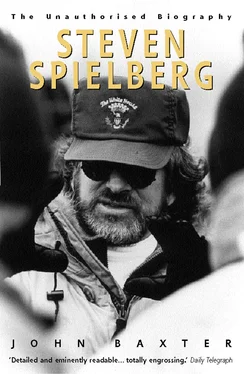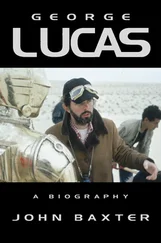His Universal contract had won Spielberg an agent. He was accepted by the prestigious International Creative Management, founded by David Begelman, a plump middle-aged man, famous as one of Hollywood’s highest-betting poker players, but also well-known, because of arguments like that with his ex-client Cliff Robertson, as chronically unreliable. Spielberg’s first representative at ICM was Mike Medavoy, himself later a studio executive. ‘Spielberg came in with… Amblin’ ,’ Medavoy recalled. ‘I saw it and I said: “Terrific!”’ Medavoy got him a few commercials, one of which featured a black actress named Margaret Avery, whom Spielberg would remember when he came to direct The Color Purple .
But he and Medavoy disagreed over Universal, to which Spielberg, disconsolate about the lack of work on the outside, was thinking of returning. Medavoy recalled:
I wanted him to get out of that contract. He wanted to stay. He was right, actually, to stay. My feeling was that at Universal at that particular time – this was right before Airport – he’d get boxed into doing garbage. And I had just gotten Phil Kaufman out of his contract. So I said, ‘Listen, you should get another agent, I don’t think your career is going to go anywhere if you stay there.’ So I got him another agent within the same agency.
The new agent was Begelman’s partner, Freddie Fields, who was decisively to launch Spielberg’s career. During his sabbatical, Fields took him round the traditional circuit of all film-makers looking for backing. One stop was at Twentieth Century-Fox, then being run by Richard Zanuck while his father Darryl, who’d founded the company almost forty years before, enjoyed European retirement with a series of darkly dramatic French mistresses like the singer Juliette Greco.
Novelist John Gregory Dunne described Zanuck, then thirty-eight, as ‘a tightly controlled man with the build of a miniaturised half-back, twelve-month tan, receding brown hair and manicured fingernails that are chewed to the quick. He has hesitant blue eyes, a quick embarrassed smile and a prominent jaw whose muscles he reflexively keeps knotting and unknotting.’ The tics hid a violent temper. Around Fox, Zanuck was known as ‘Little Napoleon’, after Nehemiah Persoff’s twitchy gang boss in Billy Wilder’s Some Like it Hot .
David Brown, twenty years older than Zanuck, a pipe-smoker with a bushy moustache which earned him the nickname ‘The Walrus’, handled story operations from New York and acted as Zanuck’s adviser and lieutenant. He affected a vague manner that belied his long experience as magazine writer, editor and publisher. His politeness and tact made him ideal to act as a buffer between the volatile Zanuck and the world. An odd but effective team, Zanuck and Brown had launched some of Fox’s biggest hits, though their decision in 1970 to abandon the broad entertainment values of their earlier successes like The Sound of Music, Hello Dolly! and Butch Cassidy and the Sundance Kid for more challenging, adult films was already eroding their power with the acutely profit-conscious Fox board.
It was this pair that Fields brought Spielberg to meet. As a package, he offered Ace Eli , with Robertson to star and Spielberg to direct. Zanuck suspected Spielberg was a better salesman than director. ‘I found him tremendously gifted, at least from a conversational point of view, but it was a highly physical and complex film, and I didn’t think he had the experience to do stunt flying and all that.’ They did buy the script, however, Spielberg’s only sale during his absence from Universal.
Spielberg later gave the impression that he spent a year away from Universal, but, despondent with his attempt at independence, he actually returned after only four months.
‘Sid,’ he told Sheinberg, ‘I’m ready to eat crow and pay my dues. Assign me something.’
Word of his problems on Eyes had spread, however, and nobody wanted him. ‘I was regarded on the Universal lot as a folly, a novelty item, bric-a-brac for the mantelpiece. Something to joke about at parties.’
Fortunately, Night Gallery got good reviews when it went out on 8 November 1969, and NBC commissioned the rest of the series. With hindsight, Spielberg could see that he had a lot to learn, and that the best way to do so was to work. He could admit now that Eyes was a disaster, and that watching Sackheim eviscerate his work, however humiliating, had been a salutary display of the power of editing.
Sheinberg offered him six directing assignments. For Marcus Welby MD , a plodding but popular series starring Robert Young as a kindly Santa Monica physician, Spielberg directed an episode called The Daredevil Gesture , about a teenage haemophiliac who risks his life on a class field trip to prove his courage. Unable to instil individuality with bravura camerawork, he tried for Significance in performances. ‘I was taking Marcus Welby seriously,’ he said later, self-mockingly. ‘… and a lot of these older actors would look at me… wondering, “Gee, I’m doing three shows this week and this guy is acting like this is Twelve Angry Men with Henry Fonda.” And I’m trying to flush out Marcus Welby and making an ass of myself on the set.’
He had even less success with Make Me Laugh , another segment of Night Gallery . In a variation on the Midas Touch, black comic Godfrey Cambridge is given the magic power to make people laugh – but only to laugh, even at his own death. Towards the end of shooting, in a repeat of the post-production interference of Eyes , Tom Bosley replaced Eddie Mayehoff in the role of Cambridge’s manager, and Jeannot Szwarc, not Spielberg, was called in to direct his scenes. The episode aired on 6 January 1971.
Life as a TV director was exhausting. ‘It’s very, very hard to learn film-making when you’re watching five-day television shows,’ Spielberg said. ‘People are running and shouting, and the pitch is so ear-shattering you become a neurotic before you become a movie-maker.’ Even so, it taught him a lot. ‘You learn to do your homework,’ he said. ‘TV pulled a long train, and I was the last carriage. If you didn’t finish on time and under budget, they would just cut you loose.’
He had also returned at exactly the right moment. Episode drama was dying. Networks were demanding more features. Rather than abandon their popular characters and titles. Universal lengthened episodes to ninety minutes and widened their scope while keeping to the same tight schedule and budget. Despite their length, these films still had to be shot in ten days.
Among the inflated series was The Name of the Game . Set in the world of magazine publishing, it had a rotating roster of three leading men: Gene Barry, Anthony Franciosa and Robert Stack. In the autumn of 1970, Spielberg directed L.A. 2017 , an episode written by Philip Wylie which aired on 15 January 1971. Barry crashes his car on the way to an environmental conference and wakes up in 2017 to find that Angelenos have taken refuge underground from smog and gang warfare. After siding with the rebels who want to overthrow big boss Barry Sullivan, he retreats to the surface and is transported back to his own time, converted overnight to clean-air legislation.
L.A. 2017 earned Spielberg minor eminence when he was invited to screen it at the World Science Fiction Convention. Most fans dismissed the long-haired young director in tailored leather jacket and open-necked flowered shirt as another psyched-up fast-talking Hollywood hype, but the experience alerted him to the existence of a growing national market for fantasy and science fiction. Unlike himself at their age, these kids had money to spend and the power to do pretty much what they pleased. They were obsessive about inside and advance information on science fiction films. Spielberg, still young enough to remember what it was like to be a fan, took note. Jeff Walker, a publicist who came to specialise in promoting films, including some of Spielberg’s, to this market, comments that today ‘there’s an entire market segment that thrives on knowing the stuff beforehand, that was created by [Spielberg] practically, and George [Lucas], and [ Star Trek producer Gene] Roddenberry.’
Читать дальше












